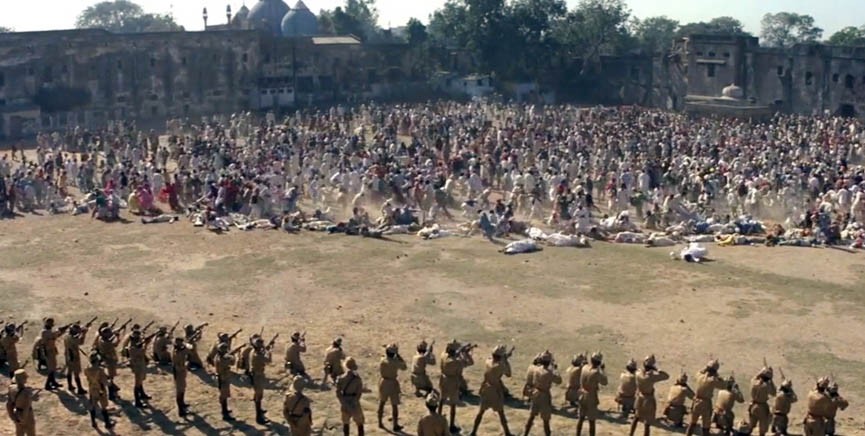
Jallianwalla Bagh tragedy and our historical narrative

The centenary of Jallianwalla Bagh tragedy in Amritsar was commemorated with an uncanny sense of ownership on April 13. To my reckoning, the incident is important, as the action of Brigadier General Reginald Dyer signified diffidence and lack of self-assurance of the British raj. The downhill slide of the British in India began soon after the Bagh tragedy because actions like the promulgation of the draconian Rowlatt Act, followed by the killings at Jallianwalla Bagh, are always perpetrated by the terrified and the weak.
In our national narrative, articulated through our textbooks and Urdu media, the Jallianwalla Bagh tragedy makes a passing reference. It will be interesting to dig out evidence on any purported action to completely excise this event from textbooks of Pakistan Studies and History during the Ziaul Haq era. I am asserting this because the event did not fit well into the ideological frame of the state-sponsored discourse on Pakistan History enforced strictly by Zia in 1980s. That frame necessitated highlighting events which established centrality of the two-nation theory where Hindus (read non-Muslims) were constructed as the ‘other’.
The pluralistic composition of the rally held in Jallianwalla Bagh provides veracity to the two-nation theory. I am not aware of any numerical details of those killed in that gory incident worked out in communally segregated terms. Even Udham Singh (whom I will come to again later) represented plural ethos when he told the court his name was Ram Muhammad Singh Azad and he took oath on Waris Shah’s Heer Ranjha, instead of any religious text. Sadly, the plural character of the incident relegated it to insignificance in the educational circles.
One may argue that people had congregated in the Bagh at the behest of Indian National Congress. They were agitating against the arrests of Dr Satya Pal and Saifuddin Kitchlew under the Rowlatt Act. But same can be said about the Khilafat Movement, which at one time was led by M.K. Gandhi. Yet the Khilafat Movement forms an integral part of our historical discourse.
Another extraordinary point is that this statist narrative showed considerable nonchalance to events where the Muslims were pitted against the colonial power. Perhaps the Khilafat Movement is the sole exception in the whole chain of events.
Up until quite recently, categories like colonial, colonialism or imperialism were denunciated as misleading if not absolutely sinful expressions mostly deployed by leftists and Marxists. Ironically these expressions have entered the lexicon of Pakistan’s religious right in the last 15 to 20 years, and are used to undercut liberal, western cultural and strategic interests.
Therefore, the response to 100 years of the Jallianwalla Bagh tragedy came as a surprise.
An upsurge of young social science academics has left a pervasive effect on the intellectual landscape of the country in the last 10 years. Many of them have the benefit of foreign exposure and their academic training warrants them to have more inclusive and far wider approach, while drawing conclusions or constructing arguments. They are equipped to transcend nationalistic confines imposed by the state.
That change is particularly visible in private universities that have greater space to maneuver than public ones. They have broadened the contours of our historical narrative. Young teachers and academics have greater opportunities to rub shoulders with international scholars who now visit Pakistan with more frequency than ever before. Such interactions have broadened the scope of their analysis. Themes like Pakistani left, religious minorities, women rights and marginalised groups are being investigated by aspiring academics. The peripheral characters and events have moved centre stage and have punctured the state-ordained narrative.
Having said all that, I am not sure how much space scholars and writers have accorded to Udham Singh, born as Sher Singh on December 26, 1899 at Sunam in the Sangrur district of Punjab. Some scholars sometimes refer to him as Shaheed-i-Azam Sardar Udham Singh. A district Udham Singh Nagar in Indian State of Uttarakhand was named after him to pay homage in October 1995 by the then Mayawati government.
I personally find him fascinating, even more than Bhagat Singh. His zeal and conviction in the plurality that Punjab epitomised in its pristine tradition makes him extraordinary. Such figures ought to be publicised more in India than in Pakistan, where Narendra Modi and Amit Shah have unleashed a tirade against the minorities.
The radical nature of Udham Singh’s role in history deserves special attention. My next column will be on him.